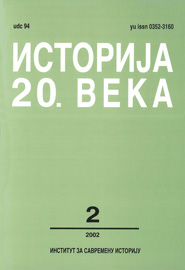РОТАРИЈАНЦИ - ДРУШТВЕНА ЕЛИТА У КРАЉЕВИНИ ЈУГОСЛАВИЈИ
THE ROTARIANS: SOCIAL ELITE IN THE KINGDOM OF YUGOSLAVIA
Author(s): Momčilo PavlovićSubject(s): Geography, Regional studies, Political history, Social history, Recent History (1900 till today), Interwar Period (1920 - 1939), Peace and Conflict Studies
Published by: Institut za savremenu istoriju, Beograd
Keywords: Kingdom of Yugoslavia; Rotarians; social elite; interwar period; reconciliation;
Summary/Abstract: In the period between two World wars, the Kingdom of Yugoslavia had the highly developed rotarian movement on its entire territory from Maribor to Bitolj. From 1927, when the first contacts with the rotarian organization from Zurich had been made, and especially after 1928, when the first clubs in Belgrade and Zagreb had been founded, to the War in 1941, that movement expanded to the entire country and almost every larger town (more than 20 000 inhabitants) that represented the economic and cultural centre had a rotary club. Yugoslavia came into war with 34 clubs and 809 members that had been organized in the special district, 77, RI since 1933. As far as the domestic policy is concerned, the rotarian organization and the Rotarians worked on the reconciliation of the national uniqueness and animosity. On the level of the foreign policy, it is hard to measure how much the rotarianism influenced policy creating, but it was beyond any doubt that M. Stojanovic’s practical activities were in relation with, that is, they were realized through the Rotarians’ connections. In their professional, public and cultural life of the town and the country in general, the Rotarians enjoyed great reputation and most of them had had significant and perceptible work, professionally or socially. In state and political institutions and organizations, they took the most important positions.
Journal: Istorija 20. veka
- Issue Year: 2002
- Issue No: 2
- Page Range: 137-153
- Page Count: 17
- Language: Serbian

